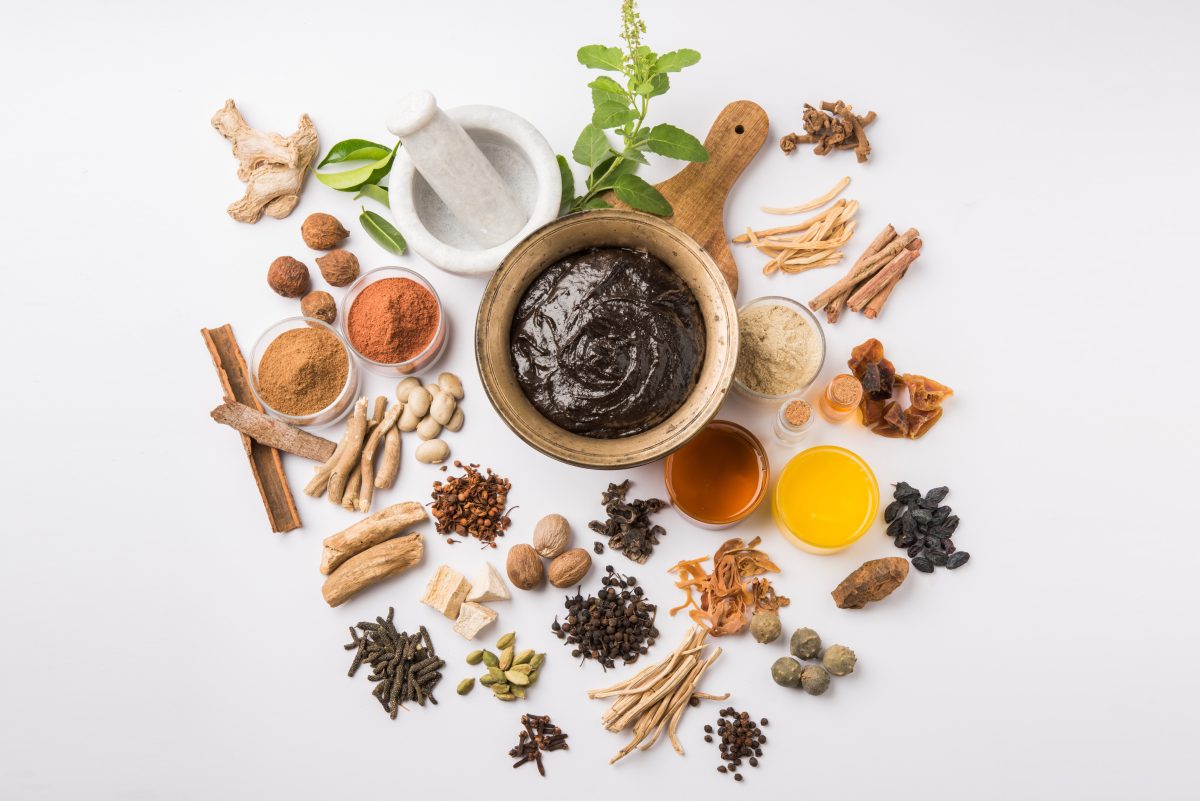SIBO Natural Treatments: Exploring Ayurvedic Remedies and Other Strategies
- SIBO
SIBO natural treatments have gained significant attention as people seek alternatives to conventional approaches for managing Small Intestinal Bacterial Overgrowth (SIBO).
SIBO is a condition characterized by an overgrowth of bacteria in the small intestine, leading to digestive discomfort and symptoms such as bloating, gas, diarrhea or constipation and abdominal pain (1).
While conventional treatments like antibiotics and prokinetics are helpful, they may have limitations and potential side effects.
As a result, many people are turning to natural treatment options to address the root causes of SIBO and symptom management.
In this blog post, we will explore various natural treatments for SIBO that have shown promising results.
These approaches encompass dietary modifications, nutritional supplements, herbal remedies, and lifestyle adjustments.
Additionally, we will delve into Ayurveda, an ancient holistic system of medicine, and its unique perspective on treating SIBO.

Natural treatments for SIBO
When managing SIBO, natural treatments offer a holistic approach that some people believe can address the underlying causes of SIBO and support symptom management; however, there is no scientific evidence to back this up.
One study suggested that herbal treatment of SIBO was as effective as antibiotic treatment (2).
Unfortunately, data regarding herbal supplements for SIBO is minimal, and the available products differ significantly in composition and quality.
Allicin (garlic)
Garlic has been traditionally used for its antimicrobial properties. Garlic contains allicin: the active ingredient that exhibits antimicrobial effects (3).
Despite alternative therapists often claiming that allicin can benefit SIBO symptoms by reducing bacterial overgrowth, scientific studies do not prove this.
Raw garlic is one way to obtain allicin, which is released when crushed or chopped. But you might be thinking, “Garlic is high in FODMAPs!”
You would be correct – you should avoid whole garlic if you are on a low FODMAP diet or find that garlic aggravates your symptoms.
However, consider utilizing garlic oil, as the FODMAPS will not be transferred.
You can read more about it in our blog post: Garlic FODMAP content explained.
An alternative sometimes used is an allicin extract containing no FODMAPS. These garlic supplements are formulated to provide a standardized amount of allicin, ensuring a consistent dosage.
One example of an allicin supplement would be Allimed; however, health food shops such as Holland and Barrett stock alternatives.
Peppermint oil
Peppermint oil has been studied for its potential benefits in managing SIBO symptoms. It contains active compounds, particularly menthol, that exhibit antimicrobial and smooth muscle relaxant properties.
Studies have shown peppermint oil to be a safe short-term treatment option for IBS. You can read more in-depth about this in our blog: Peppermint oil capsules and IBS.
Although the research is less strong on SIBO, one study has shown that peppermint oil can inhibit the growth of bacteria (4).
However, this study was not completed in humans and did not successfully eradicate the bacteria (required for SIBO treatment).
Another study suggested that by helping to relax the gastrointestinal tract muscles, peppermint oil aided in alleviating intestinal spasms and promoting better motility (5).
However, the study that showed this was a case report, demonstrating results in only one human. We cannot base recommendations on this as the results could be due to chance or other external factors.
It’s important to note to use peppermint oil cautiously, as it can cause heartburn or acid reflux in some individuals, and only a limited number of weak studies have been done, only looking at short-term interventions (7).
Oregano oil
Oregano oil is another natural remedy that has gained attention for its potential benefits in managing SIBO, primarily due to its high concentration of carvacrol and thymol, which are claimed to inhibit the growth of bacteria.
However, the only scientific studies that test oregano oil’s antimicrobial properties were completed in test tubes, not in humans (8). As such, we would not recommend taking oregano oil for SIBO, as there is no proof that it would work.
Pau d’arco
Pau d’arco, aka Tabebuia avellanedae or Tabebuia impetiginosa, is a herbal remedy used in traditional medicine, particularly in South American cultures.
It is known for its antimicrobial and anti-inflammatory properties, which has led to its exploration as a potential natural treatment for various health conditions, including SIBO.
However, despite anecdotal evidence and traditional use, there has yet to be any current published scientific research on pau d’arco and its effectiveness in treating SIBO.
Again, it’s important to note that pau d’arco has not been proven to work for the treatment of SIBO, and further research would be needed to understand its efficacy and safety.
Berberine
Berberine is a natural compound found in various plants, including goldenseal, Oregon grape, and barberry. Its antimicrobial and anti-inflammatory properties have gained attention, making it another popular choice in trying to treat SIBO naturally.
Berberine works by affecting the cell membrane of the bacteria, as well as interfering with its metabolism, inhibiting the growth of harmful bacteria. Berberine may also help reduce inflammation in the gut, supporting overall digestive health (9).
One randomised controlled trial showed that Berberine reduced symptoms such as bloating, gas, and abdominal pain in patients with IBS-D (10). However, these studies have not been replicated in patients with SIBO.
Other claimed natural treatments
Some alternative therapists claim that other SIBO natural treatment options work, such as the following:
- Activated charcoal
- Partially hydrolysed guar gum
- Digestive enzymes
- Iberogast
- Biofilm disruptors
However, none of these can treat SIBO, and no evidence supports their use.
You can read more about the above supplements and whether they are suitable to help treat SIBO in our blog post: SIBO supplements – dietitian review.
Ayurveda treatment for SIBO
Ayurveda, the ancient holistic healing system from India, claims to offer a comprehensive, whole-system approach to treating various health conditions.
Ayurvedic treatments aim to balance the body, mind, and spirit by addressing the root causes of the imbalance.
In Ayurveda, Agni (digestive fire) and Ama (toxic buildup) are said to play a crucial role in digestive health.
Agni represents the digestive power, while Ama refers to undigested food particles and toxins that can accumulate in the digestive system.
In the context of SIBO, impaired Agni and increased Ama are considered contributing factors.

Dietary modifications
Ayurveda emphasizes the importance of an individualized diet that supports Agni and minimizes the production of Ama.
Some Ayurvedic recommendations, although variable, include modifications such as:
- Incorporating warm and light foods
- Avoiding processed or refined foods
- Including ‘digestive spices’ like ginger, cumin, and coriander – this is thought to enhance Agni.
- Include healthy fats such as olive oil to facilitate the absorption of fat-soluble vitamins.
There are also some Ayurvedic principles around optimizing food combining to support digestion.
For example, avoiding combining incompatible food groups is suggested, such as consuming fruits with other foods or mixing dairy with meat or fish.
No current scientific evidence suggests that these principles support the treatment of SIBO.
Herbal treatments
Ayurveda also utilizes herbs and herbal formulations. Some commonly used herbs in SIBO ‘treatment’ in Ayurveda include Trikatu, Triphala, and Pippali.
It’s important to note that while people traditionally used these herbs for digestive health, scientific research explicitly targeting their effectiveness in treating SIBO is not available, so they are not recommended.
Trikatu
Trikatu (a blend of ginger, black pepper, and long pepper) is known for its ability to stimulate the digestive fire (Agni), which is essential for proper digestion and absorption of nutrients.
Ayurveda practitioners also believe that Trikatu supports healthy gut motility, which is crucial for proper food movement through the digestive tract.
Enhancing peristalsis (the rhythmic contractions of the intestinal muscles) may help prevent food stagnation and reduce the risk of bacterial overgrowth in the small intestine (11).
It also contains bioactive compounds, such as gingerols and piperine, which possess anti-inflammatory properties (12).
Inflammation is often associated with SIBO, so, theoretically, Trikatu may help reduce gut inflammation and alleviate related symptoms.
However, there is no scientific evidence to back up these claims. We would need rigorous clinical trials to show an effect before recommending its use.
Triphala
Triphala is an Ayurvedic herbal formulation of three fruits: Amalaki, Bibhitaki, and Haritaki.
It is one of the most well-known and widely used herbal remedies in Ayurveda for its digestive and detoxifying properties.
While Triphala is not specifically targeted towards SIBO treatment, it is thought to support overall digestive health by regulating bowel movements and containing anti-inflammatory compounds, which may indirectly benefit individuals with SIBO (13).
However, there are currently no clinical trials assessing the effects of Triphala on IBS or SIBO management, so it is difficult to determine whether it could be useful or harmful.
Pippali
Pippali, also known as long pepper (Piper longum), is another herb commonly used in Ayurvedic medicine. It is known for stimulating the digestive fire (Agni) and improving digestion.
It is believed to have carminative properties, which can help alleviate gas, bloating, and abdominal discomfort.
Pippali possesses antimicrobial properties, including against certain bacteria associated with SIBO. It may help inhibit the growth of harmful bacteria in the small intestine, potentially reducing bacterial overgrowth and alleviating SIBO symptoms (14).
Again, while Pippali has traditionally been used for digestive health, scientific research targeting its effectiveness in treating SIBO is limited.
As with any herbal remedy or treatment, consider individual sensitivities and potential interactions with medications or supplements. Please also follow the guidance of a registered healthcare professional.
Ayurvedic Lifestyle practices
Daily routines (Dinacharya)
Ayurveda emphasizes the importance of lifestyle practices that support digestion and overall well-being. This includes daily routines such as:
- Maintaining a regular eating schedule
- Practising mindfulness when eating
- Managing stress through techniques like yoga and meditation
- Getting adequate rest and sleep.
Stress management, sleep, and regular eating can all positively impact IBS management, so this aspect may be effective in supporting symptom management in people with SIBO.
Panchakarma
Panchakarma is a detoxification and rejuvenation therapy in Ayurveda that aims to eliminate Ama and restore balance.
It involves a series of treatments, including Abhyanga (therapeutic oil massage), Swedana (herbal steam therapy), and Basti (herbal enema).
Panchakarma can be tailored to the individual’s needs, helping to cleanse the digestive system, improve Agni, and promote overall wellness.
While Ayurvedic treatments can offer holistic support in managing SIBO, it’s essential to approach them as complementary to conventional medical approaches if you wish to try them due to the lack of evidence that they work.
Natural remedies should not be a substitute for conventional medical care, and some elements may be unsafe for you to follow. Be sure to seek advice from a registered healthcare professional before commencing any new treatment strategies.
Conventional treatments for SIBO
While some natural treatments for SIBO offer promising alternatives, it’s important to understand the conventional treatment options available.
Antibiotics, such as rifaximin, are the only proven way to eradicate bacteria causing SIBO.
Some lifestyle adaptations to support the treatment of SIBO include the following:
- Stress management
- Regular exercise
- Dietary changes
You can read more about conventional treatments and lifestyle adaptations related to SIBO in our post: Small Intestinal Bacterial Overgrowth (SIBO).
Summary
Despite the availability of conventional treatments, many individuals seek natural alternatives due to concerns about the potential side effects and the desire for a more holistic approach.
SIBO is a complex condition that may require a multifaceted approach. Still, natural remedies should not be seen as a substitute for conventional medical care. There is very little evidence to prove their efficacy.
Until we get more robust evidence done in humans around the efficacy and effectiveness of these natural treatments, we do not recommend natural remedies or Ayurveda to treat SIBO.
Written by Annabelle Green, Registered Dietitian, reviewed by Kirsten Jackson, Consultant Dietitian BSc Hons, RD, PG Cert